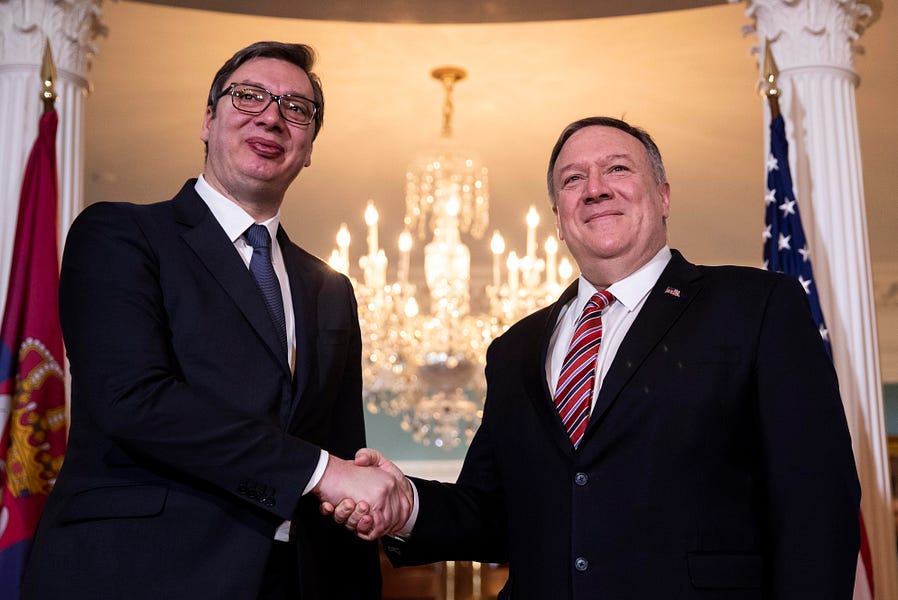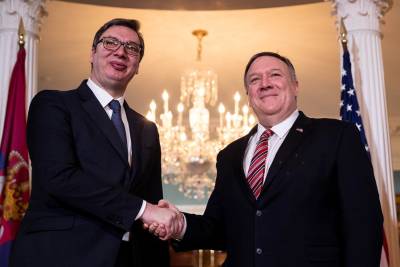Transatlantic relations have been, to say the least, turbulent during Trump’s presidency. The United States and the EU have disagreed vehemently on defense spending, security issues, and energy infrastructure.
The future of the Western Balkans has now come into crosshairs, too—with two streams of negotiations on Kosovo underway, hosted by the United States and the EU, respectively. Today, Serbian President Aleksandar Vučić will meet Kosovo Prime Minister Avdullah Hoti at the White House—just three days before the EU-sponsored expert-level dialogue resumes in Brussels.
Following almost a decade of NATO-led peacekeeping, Kosovo declared independence from Serbia in 2008. Unlike most governments around the world, Belgrade never recognized Kosovo’s independence, and the process of ‘normalizing’ relations between the two has dragged on ever since. Even more than the rest of the Balkans, Kosovo’s is a fragile state and its frozen ethnic conflict could unfreeze easily, with deadly consequences for the region.
The White House summit, originally scheduled for the end of June, understandably irked the Europeans. Trump’s man convening the meeting, Special Envoy Richard Grenell, managed to alienate much of Germany’s political class during his brief stint as U.S. ambassador to Berlin. And while this time around he claims to “support our friends in Europe,” the talks today fit well into the image of a U.S. administration too eager for publicity stunts.
While the summit in June did implode, it was not, as one would suspect, because of the Trump administration’s incompetence. Rather, it unraveled under the EU’s pressure. First, Kosovo President Hashim Thaçi—already halfway across the Atlantic—was indicted for war crimes by the Kosovo Specialist Chambers, a court set up under the EU’s auspices. Then Prime Minister Hoti, expected to arrive in Washington, canceled. The next day, both he and Vučić appeared in Brussels to meet with the president of the European Commission, Ursula von der Leyen, who announced a reinvigoration of the EU-led Belgrade-Pristina Dialogue.
Does that make the White House meeting today superfluous? Not really. For one, the lingering question of Kosovo’s recognition by Serbia, unacceptable to Belgrade, has been left front and center of the EU’s recent efforts. But the EU-led talks will be “meaningless” if they focus on Kosovo’s recognition as a sovereign state, according to Vučić.
Moreover, the EU’s largely technocratic, process-oriented approach that ought to “help [Serbia and Kosovo] move forward on their respective European paths” has been constantly undercut by reluctant member states, especially France, which view future EU enlargements with suspicion. As a result, the bloc has achieved little progress in the region since the Brussels Agreement in 2013, which committed Kosovo and Serbia to a gradual “normalization” of their relationship. That was predicated on a continuation of the accession process, which has now stalled. Kosovo, meanwhile, has yet to be granted visa-free access to EU member states, despite meeting the relevant criteria two years ago.
Perhaps Europeans can take solace in the notion that the “normalization of relations between Kosovo and Serbia is a serious process,” as the EU special representative for the Belgrade-Pristina dialogue Miroslav Lajčák tweeted, “rather than an act.” Tellingly, Lajčák’s own home country of Slovakia—where he served as foreign minister for a decade—numbers among the five EU member states not to have recognized Kosovo’s status as an independent country, making him an odd figure to press for the “normalization” of Serbia’s relations with Kosovo.
At what seems a low point in transatlantic relations, it is worth remembering that the US and EU interests in the Western Balkans largely coincide. Their respective toolboxes and their willingness to use them, however, do not. European unwillingness to stop the war in the Balkans during the 1990s ended only when America decided to lead the charge. And since the Obama administration lost interest in dialogue over Kosovo in 2008, considering it a European problem, progress stalled. For all the administration’s lack of subtlety, having the United States back in the game is beneficial if only because it creates a sense of urgency in Brussels.
One big factor to consider is how the “serious process” has led to a power vacuum now filled by Russia and China. President Vučić famously called European solidarity a “fairy tale” while praising Chinese medical assistance in the early days of the COVID-19 crisis. Russia, meanwhile, has firmly entrenched itself in Serbia’s energy sector, and its malign influence and meddling have successfully exploited the themes of Serbian, or Orthodox, victimhood. Characteristic of Russia’s interest in perpetuating the dysfunctional status quo and frozen conflict, Russian Foreign Minister Sergei Lavrov said in June that any agreement between Kosovo and Serbia had to be subject to approval by the U.N. Security Council—thereby reserving a veto power for Russia. It is also telling that before heading to Washington, President Vučić met with Russia’s ambassador on Wednesday to discuss the negotiations with Kosovo.
The meeting today presents an opportunity to push back against Russia’s and China’s activities in the region—an issue that the EU finds too awkward to discuss. Hard questions ought to be asked about Serbia’s recent purchases of missile-armed Chinese drones and their interest in Chinese air defense missiles, and weapons from Russia—let alone 5G, facial recognition cameras and Huawei’s extensive activities in Serbia. Brussels might be willing to turn a blind eye to Serbia’s “strategy of neutrality” but Washington must not, especially if Belgrade wishes to acquire American weapons.
And, as for the political settlement between Serbia and Kosovo, the Trump administration can use NATO security guarantees, financial assistance, and U.S. investment into infrastructure to get both sides to a deal. Arguably, the incentives are weaker than in the case of the other surprising ‘normalization’ that has recently been facilitated by the US: between Israel and the United Arab Emirates. While both Middle Eastern nations are concerned about Iran, Kosovo and Serbia continue to hold different views of their security environment and the challenges posed by Russia and China. Yet, contrary to Lajčák’s assertion, “normalization” can be an act and not an open-ended process. By the end of the day, we will likely know whether a U.S. offer, which neither side can refuse, is possible or whether the current limbo is likely to continue. That information will be in and by itself a useful one.
Either way, the West desperately needs a shared long-term strategy for the Western Balkans. And while their political methods and approaches to diplomacy might differ, Americans and Europeans should continue to wish the same things for the region: to bring the remaining countries into the West’s fold and keep them away from China and Russia; to facilitate their transition toward democracy, rule of law, and market economies; and, most importantly, to avoid the recurrence of the horrific conflicts that ravaged the region in the 1990s.
While both the EU and the United States have been concerningly derelict in their duties in the region, finger-pointing and wounded pride are not going to make the situation on the ground any better. That is why policymakers on both sides of the Atlantic ought to wish that the meeting today be a success and not another cringeworthy moment in the recent history of transatlantic relations.
Photograph of Aleksandar Vučić by by Ting Shen/Xinhua via Getty.






Please note that we at The Dispatch hold ourselves, our work, and our commenters to a higher standard than other places on the internet. We welcome comments that foster genuine debate or discussion—including comments critical of us or our work—but responses that include ad hominem attacks on fellow Dispatch members or are intended to stoke fear and anger may be moderated.
With your membership, you only have the ability to comment on The Morning Dispatch articles. Consider upgrading to join the conversation everywhere.